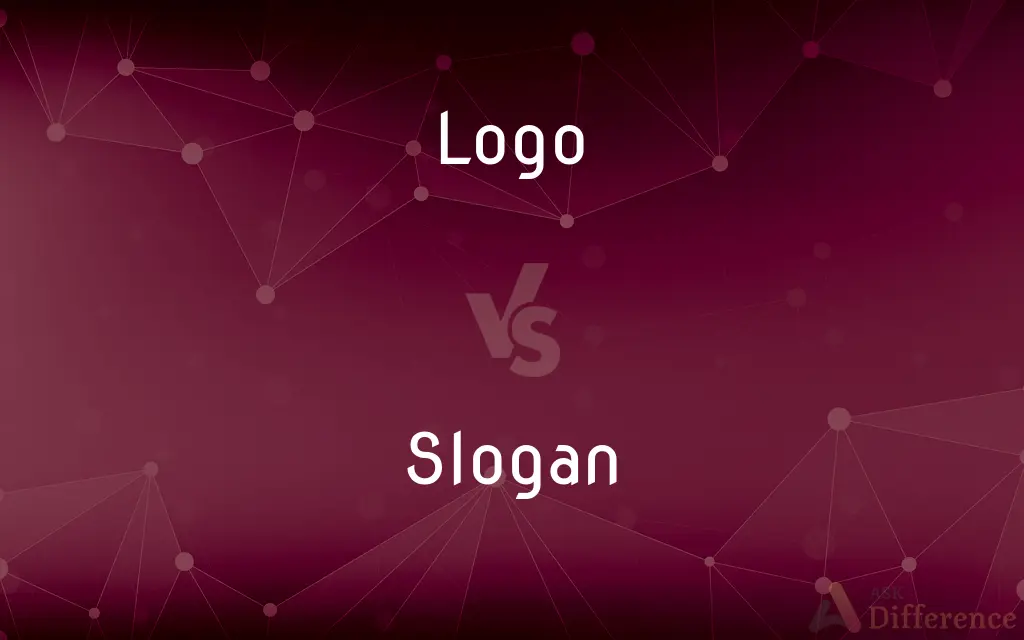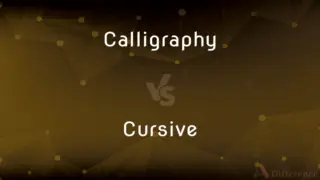Logo vs. Slogan — What's the Difference?
By Urooj Arif & Fiza Rafique — Updated on March 11, 2024
A logo is a visual symbol representing a brand, while a slogan is a catchy phrase that communicates a brand's message.

Difference Between Logo and Slogan
Table of Contents
ADVERTISEMENT
Key Differences
A logo and a slogan serve as crucial elements of a brand's identity, but they do so in different ways. A logo is a distinct visual design that represents the brand's visual identity, often consisting of symbols, icons, or stylized brand names that are easily recognizable. It's designed to visually anchor the brand in the consumer's mind. On the other hand, a slogan is a short, memorable phrase that communicates the brand's message, values, or promises. It uses language to connect emotionally or logically with consumers, reinforcing the brand's identity through words.
While a logo is primarily a visual element, a slogan relies on the power of language to convey a brand's essence or appeal. The logo's role is to symbolize the brand visually, making it immediately identifiable even without words. Whereas, the slogan complements the logo by adding a narrative layer to the brand, encapsulating its mission, vision, or unique selling proposition in a concise statement.
Both logos and slogans are integral to brand recognition, but they engage with the audience in distinct manners. Logos appeal to the visual senses and are designed to be recognized at a glance, creating a long-lasting visual impression. Slogans, however, appeal to the auditory senses and the mind's ability to remember catchy phrases, thus reinforcing the brand's message or values through repetition.
The creation process for logos and slogans also differs significantly. Designing a logo involves visual creativity and often requires graphic design skills to create a unique symbol or typographic treatment that stands out. Creating a slogan, however, is a linguistic challenge that involves crafting a memorable and impactful phrase, requiring expertise in language and marketing to resonate with the target audience.
Logos and slogans have different uses across various brand materials. A logo can be used independently on products, business cards, websites, and more as a stand-alone representation of the brand. Slogans, while sometimes featured alongside logos, are more often used in advertising, marketing campaigns, and promotional materials to convey specific messages or themes.
ADVERTISEMENT
Comparison Chart
Nature
Visual symbol
Catchy phrase
Purpose
Represents brand visually
Communicates brand's message
Appeal
Visual senses
Auditory senses and memory
Creation
Requires graphic design skills
Requires expertise in language and marketing
Application
Used across all brand materials independently
Often used in advertising and alongside logos
Compare with Definitions
Logo
Symbolic representation.
The Nike Swoosh logo symbolizes motion and speed.
Slogan
Brand phrase.
Nike's Just Do It encourages determination.
Logo
Emblem.
The Starbucks mermaid emblem is distinctive in the coffee industry.
Slogan
Motto.
Google's Don't Be Evil reflects its corporate ethics.
Logo
Visual identity.
Apple's bitten apple logo is iconic in the technology industry.
Slogan
Promotional message.
Think Different by Apple encourages innovation.
Logo
Brand mark.
The McDonald's golden arches are recognized worldwide.
Slogan
Marketing tagline.
McDonald's I'm Lovin' It captures consumer enjoyment.
Logo
Trademark.
The Coca-Cola script is a registered trademark known globally.
Slogan
Catchphrase.
Because You're Worth It by L'Oréal emphasizes self-worth.
Logo
A logo (abbreviation of logotype, from Greek: λόγος, romanized: logos, lit. 'word' and Greek: τύπος, romanized: typos, lit. 'imprint') is a graphic mark, emblem, or symbol used to aid and promote public identification and recognition. It may be of an abstract or figurative design or include the text of the name it represents as in a wordmark.
Slogan
A slogan is a memorable motto or phrase used in a clan, political, commercial, religious, and other context as a repetitive expression of an idea or purpose, with the goal of persuading members of the public or a more defined target group. The Oxford Dictionary of English defines a slogan as "a short and striking or memorable phrase used in advertising." A slogan usually has the attributes of being memorable, very concise and appealing to the audience.
Logo
A symbol or other small design adopted by an organization to identify its products, uniform, vehicles, etc.
The Olympic logo was emblazoned across the tracksuits
Slogan
A phrase expressing the aims or nature of an enterprise, organization, or candidate; a motto.
Logo
A symbol or design that identifies a brand.
Slogan
A phrase used repeatedly, as in advertising or promotion
"all the slogans and shibboleths coined out of the ideals of the peoples for the uses of imperialism" (Margaret Sanger).
Logo
A visual symbol or emblem that acts as a trademark or a means of identification of a company or organization.
Slogan
A battle cry of a Scottish clan.
Logo
(by extension) An audio recording for the same purpose; a jingle.
Slogan
A distinctive phrase of a person or group of people (such as a movement or political party); a motto.
Logo
(science) A single graphic which contains one or more separate elements.
Slogan
(advertising) A catchphrase associated with a product or service being advertised.
Logo
An ensign, a badge of office, rank, or power.
Slogan
(obsolete) A battle cry among the ancient Irish or highlanders of Scotland.
Logo
A company emblem or device
Slogan
The war cry, or gathering word, of a Highland clan in Scotland.
Slogan
A distinctive motto, phrase, or cry used by any person or party to express a purpose or ideal; a catchphrase; a rallying cry.
Slogan
A favorite saying of a sect or political group
Common Curiosities
Why are slogans used?
Slogans communicate a brand's message and values in a memorable way.
What is a slogan?
A catchy phrase representing a brand's message or values.
What is a logo?
A visual symbol used to identify a brand.
How does a logo differ from a slogan?
A logo is a visual representation, whereas a slogan uses language to convey a message.
What makes a good logo?
Simplicity, memorability, and relevance to the brand.
Why are logos important?
Logos are crucial for visual brand identity and recognition.
Are logos always graphical?
Logos can also include stylized text but are predominantly visual.
How is a logo created?
Through graphic design, focusing on visual elements.
How is a slogan developed?
By crafting a memorable phrase that embodies the brand's essence.
Are slogans always in English?
No, slogans are created in the language best suited for the target audience.
Can a brand have both a logo and a slogan?
Yes, most brands use both to strengthen their identity.
Can a slogan change over time?
Yes, brands may update slogans to stay relevant or reflect new messaging.
How often should a brand update its slogan?
Depending on the market and brand evolution, but there's no fixed rule.
What makes a slogan effective?
Clarity, catchiness, and conveyance of the brand's message.
Can a logo become a trademark?
Yes, logos can be registered as trademarks to protect the brand.
Share Your Discovery

Previous Comparison
Asleep vs. Sleep
Next Comparison
Calligraphy vs. CursiveAuthor Spotlight
Written by
Urooj ArifUrooj is a skilled content writer at Ask Difference, known for her exceptional ability to simplify complex topics into engaging and informative content. With a passion for research and a flair for clear, concise writing, she consistently delivers articles that resonate with our diverse audience.
Co-written by
Fiza RafiqueFiza Rafique is a skilled content writer at AskDifference.com, where she meticulously refines and enhances written pieces. Drawing from her vast editorial expertise, Fiza ensures clarity, accuracy, and precision in every article. Passionate about language, she continually seeks to elevate the quality of content for readers worldwide.
















































